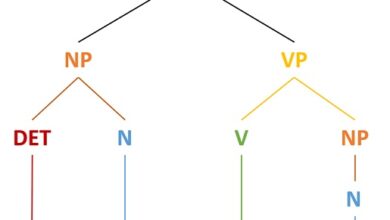Types of phrases in english
What is a phrase?
Generally speaking, a phrase can refer to any group of words. In linguistics, a phrase is a group of semantic unit of a text. In other words (or sometimes a single word) that forms a constitutive and thus functions as an individual unit in the syntax of a sentence. A phrase is smaller in the grammar hierarchy than a clause.
For example, let’s examine the sentence below:
- The dumpster at the end of the alley is smelly. [Translation: The dump at the end of the alley is stinky.]
Bold words form a phrase; Together they act as a noun. This phrase can be broken down into even more parts. So far we can identify a prepositional phrase that is functioning as an adjective:
- at the end of the alley
Further expanding, a small prepositional phrase can be found within this large prepositional phrase:
- of the alley
And within the great prepositional phrase, we find a substantive phrase:
- the end of the alley
Phrases can be identified by circumscription tests, as well as proforma substitution (which speaks of replacing). For example, the prepositional phrase “at the end of the alley” can be replaced by an adjective such as “nearby . ” Thus, the sentence could contain “The nearby dumpster” or even “The nearby dumpster” [Translation: “The nearby dump”].
Heads and dependents
Most phrases in English have an important word that defines the type and linguistic characteristics of the phrase. This word is the head of the sentence and gives its name to the category. The heads in the following sentences are in bold:
- too quickly (adverbial phrase)
- very sad (Adjective phrase)
- the gigantic elephant (noun phrase)
- at breakfast (Prepositional phrase)
- jump the rope (Verb phrase)
The head can be distinguished from its dependents (the rest of the sentence) because the head of the sentence determines many of the grammatical characteristics that make the whole set. The examples above show the five most common types of phrases. There are other types of phrases, but these are not so common. For example, one can speak of subordinate phrases:
- after that explosion
This “phrase” is commonly classified as a subordinate clause, and therefore many would not consider it a phrase. If one follows the reasoning of heads and dependents, however, then the subordinate clauses should themselves classify as phrases. Many syntax theories qualify the heads. Sometimes, however, there may be phrases without heads, which are known as exocentric . Those phrases with heads are called endocentric .
What are the most common types of phrases?
- An adjective phrase is a group of words led by an adjective. Again, what he leads is the head of the sentence, the syntactic focal point, a word whose others within the phrase serve as secondary components. This is how “very small” is an adjective phrase: it consists of a head (the adjective “small”) modified by the adverb “very”.
- A phrasal adjective (or compound), on the other hand, is a group of words that are not headed by a true adjective, but that nevertheless work together to modify a noun. An example in English could be “small-minded” : there is not a single adjective head, only a phrase without a head that is indivisible, but that also serves as an adjective function.
- Similarly we have adverbial phrases , such as “massively slowly” , whose head is the word “slowly” which is modified by the adverb “massively”.
- A prepositional phrase is a type of headless phrase that consists of a preposition plus an object (noun or pronoun) and usually serves as an adverbial or adjective function, as well as “in the porch” within “They stood in the porch” and “With the irritating kid” in “The lady with the irritating kid” .
- Similarly, we also have the substantive phrase , but it is used for two different things. In a narrower sense, a substantive phrase is all that led or headed by a noun (such as “the irritating kid” : head “kid”, modified by the adjective “irritating” and determined by the article “the”). In a freer sense, however, it can be any phrase that serves as a noun, and can thus include not only a simple noun or pronoun, but also an infinitive phrase functioning as a subject-sentence. Another more common term for the English noun phrase is nominal.
Importantly, everything I wrote above represents terms for both word classes (individual words) and types and functions (words and phrases that functionally correspond to particular word classes).
Additionally we also have those that can be considered high-level types of function, which subsume the typical functions of more than one class of words: determinants (which may be articles or adjectives), modifiers (non-complementary adjectives or optional adverbs) and connectors (conjunctions or other words that serve to connect clauses and sentences).
